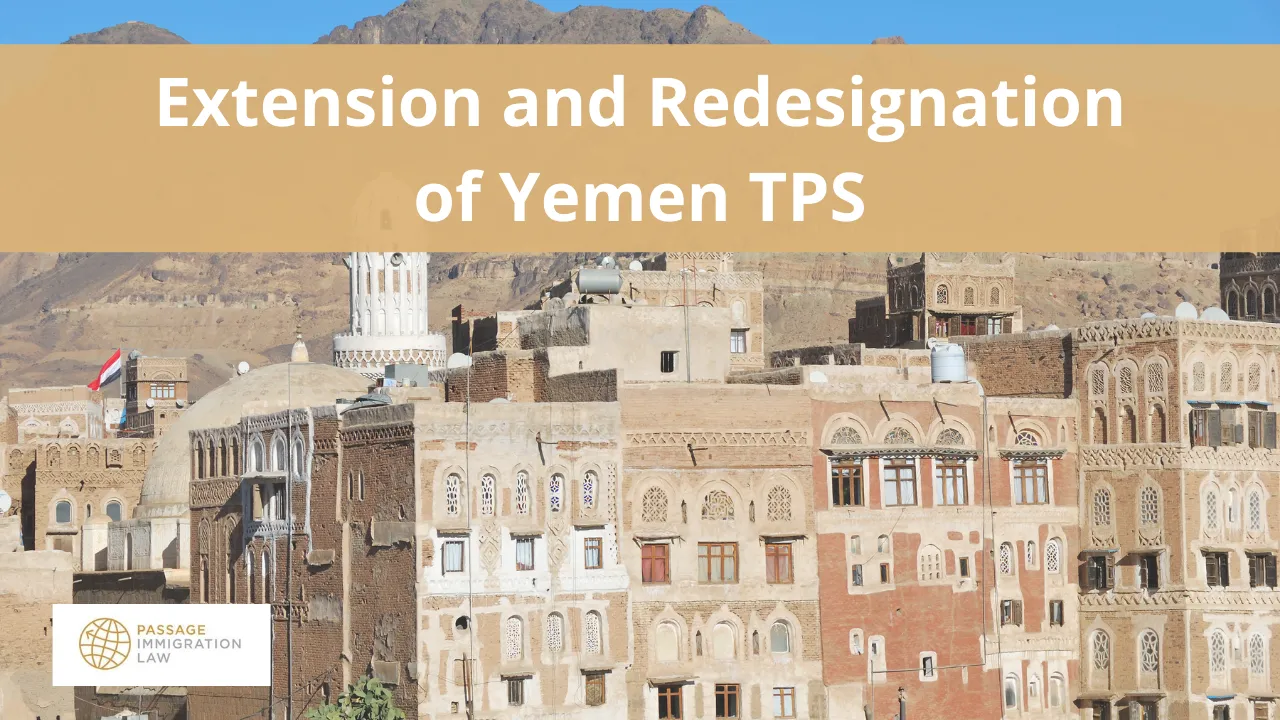Announced on July 6, 2021, by the Department of Homeland Security (DHS), Temporary Protected Status (TPS) for Yemeni people has been extended through March 3, 2023. There will be an 18-month period during which Yemenis can either extend or re-designate their TPS.
What circumstances led the DHS to decide on this course of action? There has been over a decade of political turmoil in Yemen since the Arab Spring after a failed transition of power. The Houthi rebels have remained at war with the foreign-backed Sunni Muslim government since 2014, when the transition of power occurred. As said by Secretary of Homeland Security Alejandro N. Mayorkas, “Yemen continues to experience worsening humanitarian and economic conditions that prevent individuals from safely returning to their homes; therefore, I have decided to extend and re-designate Yemen for Temporary Protected Status. We will continue to protect and offer these individuals a place of residency temporarily in the United States.”
This announcement of extension and redesignation of Yemen TPS permits around 1,700 current beneficiaries to keep TPS through March 3, 2023, and about 480 Yemeni nationals who have been continuously residing in the United States to file initial TPS applications.
If you are eligible for TPS for Yemen and have not held TPS for Yemen before, go to the USCIS webpage and fill out an I-821 form to apply for legal US immigration status.
TPS Application Process for New Yemeni Applicants
For initial TPS status, newly eligible Yemeni nationals can apply if they can prove continuous residence in the United States since December 29, 2022, and continuous presence in the United States since March 4, 2023.
Applicants must file a Form I-821 application, including the appropriate fee or request for fee waiver, with U.S. Citizenship and Immigration Services (USCIS) during the initial registration time, which runs from January 3, 2023 through September 3, 2024. Applicants may also apply for EADs and travel authorization during this period by forwarding the corresponding forms and fee(s) or fee waiver request. TPS and its related work authorization will be accepted with a September 3, 2024, expiration date.
All applicants applying for TPS go through security and background checks as part of establishing eligibility. Such biometrics collection as fingerprinting is generally needed for applicants ages 14 and older.
Re-registration for Current TPS Beneficiaries
Current Yemeni TPS holders can extend their status and work authorization provided that they were previously registered for TPS, and their application was approved. However, re-registration is restricted to those who previously registered for and were granted TPS under the designation for Yemen. Current Yemeni TPS holders must submit Form I-821 to USCIS between January 3, 2023, and March 4, 2023.
TPS holders who want to extend their employment authorization must also submit a timely Form I-765 application for an employment authorization document (EAD) and the applicable fees or a fee waiver application.
To benefit from the extension, there is no need for a foreign national with a pending TPS and/or EAD application to file a second application. For applications that are pending when the re-registration period starts on January 3, 2023, acceptance notices and document expiration dates will reflect the updated expiration date of September 3, 2024.
As the Department of Homeland Security recognizes that re-registrants may not acquire new EADs before their current cards expire, it is giving an automatic extension through March 3, 2024, for EADs bearing a Category code of A-12 or C-19 and an expiration date of March 3, 2023, or September 3, 2024. The Federal Register notice offers particular instructions on proper completion of an I-9 form to reflect an automatically extended TPS EAD.
Relaxed Employment Authorization Rules for Yemeni Students
The Department of Homeland Security is renewing its suspension of particular employment authorization rules for Yemeni students in F-1 status who are experiencing severe financial hardship as a consequence of the severe crisis in Yemen. Under the relaxed rules, eligible Yemeni F-1 students may request a reduction in their course load, an employment authorization, and work an increased number of hours while school is in session, while continuing to establish their F-1 nonimmigrant student status. The DHS will deem students who get employment authorization under this policy to be engaged in a “full course of study” if the student establishes the minimum course load requirements described in the Federal Register notice extending the policy.
The relaxed employment authorization rules for such students, which were set to expire on March 3, 2023, have been extended through September 3, 2024.
In order to qualify, F-1 students must prove that they:
- are Yemeni citizens or individuals having no nationality who last habitually resided in Yemen;
- are currently maintaining F-1 status;
- were legally present in the United States with F-1 status on January 3, 2023;
- are experiencing severe economic hardship as a direct result of the current crisis in Yemen; and
- are enrolled at an academic institution that is Student and Exchange Visitor Program (SEVP) certified.
F-1 students who obtain authorization from their Designated School Official (DSO) to work off campus may apply for an EAD by submitting the required application form and corresponding fee or fee waiver request. F-1 students employed on campus are not required to apply for an EAD but do require DSO authorization.
Consult with an Experienced Immigration Lawyer
If you have any queries about Temporary Protected Status (TPS), you should contact an experienced immigration attorney for expert legal advice before next year’s deadline has been reached. Failing to meet deadlines is a lost opportunity for you. Contact us at (503) 427-8243, or you may schedule a consultation online.







